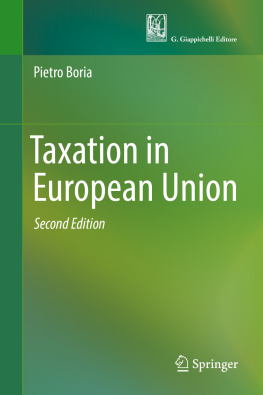1.1.1 The Tax Power as Distinctive Element of the Institutional Systems
Taxationor more precisely the regulation of tax relationsis a distinctive feature of the institutional systems, since it is essential for the effective implementation of functions related to sovereignty. In fact only the actual availability of material resourcesand specifically the financial resourcesmay help to achieve the purposes of government that the holder of sovereign power is required to seek. It seems so unquestionable in the general perception that the power of taxation is one of the closest features of the sovereignty, in order to make a decisive contribution to its own characterization under an ideological profile.
Indeed, the regulatory choices adopted for taxation in a legal system clearly show the core values and the beliefs about sovereignty in a social community. The relation between sovereignty and taxation is a distinctive feature of the constitutional arrangements of the European States, which is not expressed, however, according to uniform modules, but it takes many different forms and contents.
In this regard it is evident the contradiction between collective values, which address to the need for protection and development of the general community, and individual values, which refer to the protection and promotion of human rights and freedoms.
On one side, there is the public interest in the settlement of taxes in order to ensure the vitality and development of the community and to pursue the maximization of general goals, which can be called tax interest just to express the axiological connotation of the general value. On the other side, there are the protective values of the individual sphere, due both to the personal freedom (compared to the exercise of public power of taxation), and to the ability to pay.
The legal regulation of the power of taxation is thus shown as the fundamental transmission belt between the human wealth and freedoms and the care of the general interests and the developmental goals of the Welfare State, which is an evident index of the level of solidarity or individualism in the civil community, and, above all, an epiphenomenon of the fundamental relation between the rulers persons and the ruled persons.
This axiological relation, which is established between the collectivist and individual conflicting values, is the basic dialectic of the taxation system, according to which it can be identified the concrete unfolding of sovereignty in the several legal systems.
1.1.2 The Basic Features of the Tax Systems in Europe: Patterns of Affinity and Reason for Diversity
The power of taxation is the subject of legal regulation under several profiles. Firstly, a significant role is gained by the set of regulations regarding the taxation system and the implementation phase of the fiscal requirements (audits, collection, litigation, penalties) in which the general principles of taxation are customarily defined. In this regard it can refer to a taxation macro-system , indicating the collocation of the norms to an apical level of taxation directly into the Constitution or in constitutional laws (or in reinforced laws).
Secondly, the set of regulations that distinguishes the background structure of singles taxes is highlighted (with particular reference to the assumption, the taxpayers, the tax base and the tax rate). It is a set of rules which is placed intermediately between the macro-system (the set of principles and rules of general application) and the series of specific regulatory provisions relating to specific individual cases (which can be defined as regulatory micro-systems) and therefore it can be conventionally described as taxation middle-system . Unlike the macro-system, the middle-systems shows a lower degree of stability, not because of the use of ordinary legal sources (which therefore have not the regulatory protection of constitutional sources or reinforced laws), but especially for the functionalization that is necessary to the needs of the economic policy and of public finance.
Now, it should be noted that in the European countries it is to be found a common background about the main medium-tax systems. Indeed it is possible to verify obvious similarities in the underlying structure of the taxes which are the backbone of European public finances.
Direct taxes are articulated anywhere in the tax on personal income (basically a personal and progressive tax) and in the tax on corporate income (usually a flat tax); the relations between the two taxes are set, even though different ways, in order to prevent (or attenuate) the economic double taxation of corporate earnings.
Among the indirect taxes, the most important one is undoubtedly the value added tax (VAT), which has a regulatory legislation substantially similar in several jurisdictions (as it has been built on the same archetype). Other taxes, which come from the old European legal tradition (registration tax, stamp duty, inheritance tax), are characterized by a nearly homologous regulatory structure. Even the discipline of duties and excises is evidently similar in different countries (especially for the impulse of the EU).
The main differences are found within the local taxation systems, which are very heterogeneous and influenced by historical social matters that highlight the differences between the countries. In any case it can also be seen in this regulatory system how structurally homogeneous the various taxing jurisdictions are regarding the balanced comparison between central State taxes and regional (or local States) taxes.
In view of the similarities regarding the middle-systems, it appears on the contrary a significant differentiation among the European taxation systems regarding the connotation of the macro-system. In fact, not only significant differences can be registered in relation to the discipline of litigation and penalties, the powers of investigation of the financial administration and the protection of taxpayers rights, but also a different ideological position comes out about the comparison among the conflicting values referring to the alternative of individual-community which, as mentioned above, is the key element of the axiological matters that intrinsically permeates the taxation system since the evolutions of the modern State.
On one hand, the interest tax is imposed as a structural rule of the taxation system, legitimizing some invasive or at least strongly reductive regulatory requirements with respect to the freedom of the individual consociates. On the other hand, it gains great importance the liberal values which, in addition to measuring the position of the individual within the social community with regard to the needs of allocating taxation, allow to protect the minimal core of wealth and freedom of each citizen.
The dialectical relation between the fundamental values of the social community and those of the individual assumes a constitutional dimension which varies according to the transformation of the relations between rulers and ruled, and especially to the degree of contrast between the individual sphere and the State sphere, so as to result a typical corollary of the general relations of public law.
1.1.3 The Balance Between Fiscal Interest and Protection of Individual Freedoms in the Formation of Modern Taxation Systems












